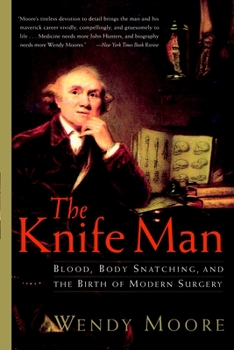The Knife Man: Blood, Body Snatching, and the Birth of Modern Surgery
Select Format
Select Condition 
Book Overview
The vivid, often gruesome portrait of the 18th-century pioneering surgeon and father of modern medicine, John Hunter. When Robert Louis Stevenson wrote his gothic horror story of Dr. Jekyll and Mr. Hyde, he based the house of the genial doctor-turned-fiend on the home of John Hunter. The choice was understandable, for Hunter was both widely acclaimed and greatly feared. From humble origins, John Hunter rose to become the most famous anatomist and...
Format:Paperback
Language:English
ISBN:0767916530
ISBN13:9780767916530
Release Date:September 2006
Publisher:Crown Publishing Group (NY)
Length:352 Pages
Weight:0.70 lbs.
Dimensions:0.9" x 5.5" x 8.2"
Customer Reviews
5 ratings
MUST read for all surgeons
Published by Thriftbooks.com User , 14 years ago
Fantastic review of modern surgery and its evolution over the last 2-3 hundred years. Makes one very appreciative of what we have today.
The Knife Man
Published by Thriftbooks.com User , 17 years ago
Fantastic, intriguing, fun to read. Brings a deep respect to our progenitors and how they ever survived those "unapprised " years. It is a great tribute to the great man John Hunter.
John Hunter: Body Snatcher, Anatomist, Naturalist
Published by Thriftbooks.com User , 17 years ago
Don't miss reading this book! It was somewhat grisly, but hard to put down. Moore tells the story of John Hunter and his inexhaustible curiousity. Hunter was a farm boy who became a London surgeon in an era when little was known about human anatomy. Hunter just had to know about the inner workings of the human body, and this led him to employ folks to snatch bodies for him. He had to know about syphilis & gonorrhea, so...well, you'll see. Jenner (small pox vaccine) was a student of Hunter. Ben Franklin corresponded with him. His work later influenced many other scientists in a broad range of fields. I had never heard of this man, but reading through Moore's book I saw that he was an extremely eccentric and influential scientist, anatomist, surgeon, and naturalist.
A Brilliant Anatomist and Surgeon in a Lively Biography
Published by Thriftbooks.com User , 19 years ago
It is hard to understand that the genius John Hunter, one of the star figures of the Enlightenment, should not be one of those scientists whom everyone has heard of. If the name does not ring a bell, it is strongly recommended that you pick up _The Knife Man: The Extraordinary Life and Times of John Hunter, Father of Modern Surgery_ (Broadway Books) by Wendy Moore. Not just a genius in surgical technique and innovator of scientific experiment to guide surgical choices, he was a brilliant anatomist of other species as well, he was an attentive teacher, and he set up a museum that demonstrated the now accepted views of the origins of life and the age of the Earth. He was constantly attentive to animal behavior and physiology and his curiosity never stopped. A mainstay to his friends, he was also willful and irascible, and made enemies easily, one of the reasons he got limited credit during his lifetime for his new ways of thinking. Moore's book is an exhilarating view of a foolhardy, energetic, innovative, and brilliant man. John Hunter was born in 1728 in Scotland. He left school at thirteen, and left Oxford after just two months. He instead followed his older brother William to London to help in William's anatomy school in Covent Garden. He would dissect thousands of bodies, and was well acquainted with the "resurrection men", the grave robbers who provided fresh, or maybe not so fresh, specimens. Hunter's reliance on observation and experiment put him squarely against the medical establishment, which had insisted on relying on Aristotle, Hippocrates, and Galen, "preferring to bleed, blister, and purge their patients to early graves." He alienated his fellow surgeons by insisting that surgery was always the last step that should be taken, and should be avoided unless absolutely necessary. His innovations in surgery include teaching (from his days as a naval surgeon) that musket balls entering the body were best left where they were, if possible; digging them out did more damage than the bullet itself. He knew the value of using a placebo when testing a medicine's powers. He made the first experimentation (on dogs) to show what the lymphatic system did. Not only was he not above dealing with the resurrection men, but he tricked the friends of Charles Byrne ("The Irish Giant") into burying a huge casket of rocks, while the giant's body went to the anatomical table. He married well, a woman poet who kept salons; they lived in different worlds, and he designed a house that would accommodate society at the front and resurrection men at the back. (Robert Louis Stevenson is said to have based Jekyll and Hyde on the idea of this structure.) He was always eager to get to his research rooms instead of socializing, but an observer said of the course-talking Scot that he was not polished or refined, "but from originality of thought and earnestness of mind he was extremely agreeable in conversation." He loved keeping strange animals, and lo
Great Historical Science Read
Published by Thriftbooks.com User , 19 years ago
This book delivers a fascinating look at the work of Dr. John Hunter, the 'Father of Modern Surgery'. Through his dissection of corpses, study of anatomy, and bold, pioneering techniques, he helped to revolutionize medicine and establish many principles of modern surgery. The book includes a strong narrative describing the intricacies of his work and the medical and cultural environment of his time period. Overall, this book is well worth reading for anyone with an interest in medicine or the history of science.






